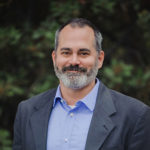It’s perhaps one of the greatest fears for a parent — that his or her child will become a victim of sexual abuse. Authors and husband and wife, Justin and Lindsey Holcomb, have responded to parents’ concerns by writing God Made All of Me: A Book to Help Children Protect Their Bodies, a resource for moms, dads and caregivers who want to protect and educate their children.
Justin and Lindsey share about the book in this Q&A.
Q: What prompted you to write God Made All of Me? What age range was it written for?
The book is for two to eight year old boys and girls. We wrote it because we have two young children and know that parents need tools to help them address body parts with their kids and to help them understand the difference between appropriate and inappropriate touch. It allows families to build a first line of defense against sexual abuse in the safety of their own homes. Our goal is to help parents and caregivers in protecting their children from sexual abuse. Because private parts are private, there can be lots of questions, curiosity or shame regarding them. For their protection, children need to know about private parts and understand that God made their body and made it special.
We want parents and caregivers to be smarter and better prepared than those who would want to harm children. While we know that actions by adults can be more effective than expecting children to protect themselves from sexual abuse, children still need accurate, age-appropriate information about child sexual abuse and the confidence that their parents and caregivers will support them. That is why we used the storybook approach.
Q: You were intentional about using the terms “appropriate” and “inappropriate” when referring to kinds of touch, instead of the words “good” or “bad.” Why?
It is important to be clear with adults and children about the difference between touch that is appropriate and touch that is inappropriate. Experts discourage any use of the phrases “good touch” and “bad touch” for two main reasons. First, some sexual touch feels good and then children get confused wondering if it was good or bad. Second, children who have been taught “good touch” or “bad touch” would be less likely to tell a trusted adult as they perceive they have done something bad.
Say something like this to your child: “Most of the time you like to be hugged, snuggled, tickled and kissed, but sometimes you don’t, and that’s okay. Let me know if anyone — family member, friend or anyone else — touches you or talks to you in a way that makes you feel uncomfortable.”
Q: Why do you encourage moms and dads to use the proper names when referring to private body parts, even for young children?
It can be uncomfortable at first, but using the proper names of body parts is important. This knowledge gives children correct language for understanding their bodies, for asking questions that need to be asked, and for telling about any behavior that could lead to sexual abuse.
Offenders most likely will not talk to children about their private parts by using the anatomically correct names for genitalia. They will likely use some playful sounding term to make it sound more like a game.
Q: How did you approach talking about this issue with your own children?
We started by teaching them the proper names of their private parts at an early age and telling them that their bodies are strong, beautiful and made by God. We read books to them from an early age on this topic and would talk about who can help them in the bathroom or bath and that it was okay for the doctor to check their private parts at appointments when mom or dad is present.
We would also role play different scenarios to get them thinking about what they would do if someone approached them and wanted to touch their private parts, show theirs, take pictures, etc. Play the “what if” game with them at the dinner table with different scenarios to gain a better understanding of their thinking and problem solving skills. “If someone asked you to show them your private parts and promised to give you candy if you didn’t tell anyone, what would you do?” Remind them that they can tell you anything and anytime without fear of getting into trouble.
We’ve also tried to instill a sense of the control our kids have over their own bodies. We would tell them to say “no” or “stop” when they were all done being hugged, tickled or wrestled. We encourage them to practice this with us so they feel confident saying it to others if the need arises. We also tell them they don’t have to hug or kiss a family member if they don’t want to and teach them how to express this without being rude. It is important to empower children to be in charge of their bodies instead of at the mercy of adults.
Q: Is there a way to educate your children about this without instilling fear?
It is important to explain about private parts in order to teach children about sexual abuse. Clearly identify for your child which parts of their anatomy are private. Explain to your child that “some places on your body should never be touched by other people — except when you need help in the bathroom, are getting dressed, or when you go to the doctor.” You can do this with young children during bath time or have your child dress in a bathing suit and show them that all areas covered by a bathing suit are “private.” The bathing suit analogy can be a bit misleading because it fails to mention that other parts of the body can be touched inappropriately (like mouth, legs, neck, arms), but it is a good start for little ones to understand the concept of private parts.
To teach about sexual abuse offenders, it is important to teach your kids about “tricky people.” Tricky people are grown-ups who ask kids for help or tell kids to keep a secret from their parents. Teach your kids not to do anything or go anywhere with any adult at all, unless they ask for permission first.
Q: What do parents need to know about child sexual abuse offenders?
Although strangers are stereotyped as perpetrators of sexual assault, the evidence indicates that a high percentage of offenders are acquaintances of the victim.
Most child sexual abuse offenders describe themselves as religious and some studies suggest the most egregious offenders tend to be actively involved with their faith community. Sex offenders are often religious and many of them attend church. In a study of 3,952 male sex offenders, 93 percent of these perpetrators described themselves as “religious.”
Dr. Anna Salter, a sexual offender treatment provider, states it is important for parents and child-serving organizations, such as churches, to avoid “high risk situations.” This is because “we cannot detect child molesters or rapists with any consistency” and thus “must pay attention to ways of deflecting any potential offenders from getting access to our children.”
Many youth organizations have prevented the abuse of children in their care simply by limiting the access of potential offenders to boys and girls. Child abusers count on privacy to avoid detection of their criminal behavior. When churches or other faith institutions remove this privacy it becomes more difficult for the offender to succeed.
Q: Is it a bad idea to force our kids to sit on an uncle’s lap or to return Grandma’s kiss? What are some ways parents can help their extended family understand the physical boundaries they allow their kids to have?
It is important to teach kids how to say, “Stop,” “All done,” and “No more.” You can reiterate this by stopping immediately when your child expresses that they are all done with the hugging or tickling. Your reaction is noteworthy for them as it demonstrates they have control over their bodies and desires.
If there are extended family members who may have a hard time understanding your family boundaries, you can explain that you are helping your children understand their ability to say no to unwanted touch, which will help them if anyone ever tries to hurt them. For example, if your child does not want to kiss Grandpa, let them give a high five or handshake instead.
Q: What are some practical things parents can do to protect their children from sexual abuse?
In our book, the last page is to parents and is called, “9 Ways to Protect Your Children from Sexual Abuse.” Some of the key practical things parents can do are: teach proper names of private body parts, talk about touches, throw out the word “secret,” and identify whom to trust. You can read about all nine here.
Q: What advice do you have for parents who want to create an open environment in their home so that their children always feel comfortable talking to them about issues related to their sexuality or body?
We remind parents that some people are out there looking to prey on our children. We have a duty to protect and prepare them for the world and to fight for them. By talking with them candidly (and again developmentally appropriate) about their bodies, we are setting up safe guards around them.
John T. Chirban has written an excellent book How to Talk to Your Kids about Sex that we highly recommend to all parents. He explains: “Someone is going to teach your kids about sex . . . shouldn’t it be you?” His book gives parents tools to talk with their children about the connections between sex, intimacy and love.
Q: It’s every parent’s worst nightmare, but what should a mom or dad do if they suspect their child might have been the victim of sexual abuse?
You can call your local sexual assault crisis center and talk with a child advocate or hotline volunteer about your concerns. They will be able to point you to the proper authorities. Some areas would have you speak with a detective, where other areas would have you talk to a victim witness advocate. Don’t ask probing questions that could instill fear in your child. Just assure them that you are so proud of them for telling you what happened, you believe them and that your job is to keep them safe.

